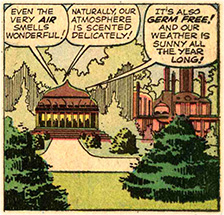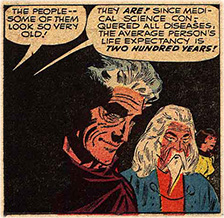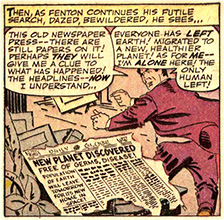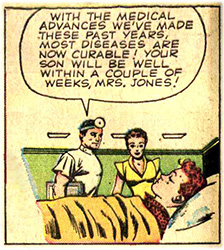- Last summer I didn’t want to re-read my ’80s Marvel comics
for the thousandth time, so I read some ’80s DC comics instead.
This summer in order not to re-read my ’80s Marvel comics for the
thousandth time I have been reading some ’60s Marvel comics.
Correction: not some, all.
At least all the superhero ones—I’m not reading
Millie the Model.
But, yeah, the company’s superhero line was small enough in the
’60s that it’s entirely possible to read every issue in a few
weeks’ spare time.
As I have mentioned in some previous articles, a lot of Marvel’s
flagship characters premiered not in their own titles but in anthology
books: Thor in Journey into Mystery, Ant-Man in
Tales to Astonish, Iron Man in Tales
of Suspense, Dr. Strange in Strange
Tales.
The superhero would generally get half of each issue and the other half
would be devoted to the Twilight Zone-style stories
that had previously made up the whole book.
Many of these stories involve travels to utopian worlds or utopian
futures—and time after time, what is the telltale sign that
indicates that this world is a paradise?
Here’s just a tiny sample:




Yes, these utopian worlds are also free of war, of hunger, of crime… but first and foremost, they are free of disease. Now that we are in the middle of a coronavirus pandemic, with an overlapping swine flu pandemic apparently on the way, it is natural for disease to be on everyone’s mind. But I found it interesting that nearly sixty years ago, while others were afraid of nuclear war and ecological catastrophe, Stan Lee was more concerned with wiping out germs.
- This month Denny O’Neil died.
His work was important to me.
I was going to write about why, but I discovered that I already did, a
few years back.
Here’s what I wrote:
 Iron Man is the first [comic book] series I ever
collected, and over on the right there you will see the very first comic
in my collection: Iron Man #174.
I’d been a big fan of the Superfriends cartoon,
which had in turn led me to the collections of Golden Age and Silver Age
comics at the Canyon Hills Library, and I expected this more or less
randomly-selected comic to be more of the same.
But this time the villain wasn’t some goon dressed in spandex trying
to nail the hero with a death ray; he was just… a bald guy in a
suit, sitting behind a desk.
His big fight with Iron Man consisted of an argument over who held the
legal rights to the armor.
Much of the plot revolved around various members of the corporate
hierarchy deciding whether or not to resign.
I pretty quickly realized that I was reading a book written for another
age group.
It was one of my great leveling-up experiences as a kid.
Iron Man is the first [comic book] series I ever
collected, and over on the right there you will see the very first comic
in my collection: Iron Man #174.
I’d been a big fan of the Superfriends cartoon,
which had in turn led me to the collections of Golden Age and Silver Age
comics at the Canyon Hills Library, and I expected this more or less
randomly-selected comic to be more of the same.
But this time the villain wasn’t some goon dressed in spandex trying
to nail the hero with a death ray; he was just… a bald guy in a
suit, sitting behind a desk.
His big fight with Iron Man consisted of an argument over who held the
legal rights to the armor.
Much of the plot revolved around various members of the corporate
hierarchy deciding whether or not to resign.
I pretty quickly realized that I was reading a book written for another
age group.
It was one of my great leveling-up experiences as a kid.
This was Denny O’Neil’s epic Obadiah Stane arc. O’Neil was best known for starting the “relevance” trend in comics [in the early 1970s] with his work on Green Lantern / Green Arrow, in which he sent the straight-arrow supercop and the beatnik archer around the country to combat social ills ranging from heroin abuse to housing discrimination, and for changing Batman from a cheerful dweeb slinging “Bat-Shark-Repellant” into a grim avenging ninja, a sort of… dark knight, if you will. A decade later, O’Neil took the reins on Iron Man and produced a four-year saga in which corporate raider Stane seizes Stark International, reducing Tony Stark to an homeless wino while his former pilot, James Rhodes, assumes his role as Iron Man. O’Neil had no interest in the gadget porn that had defined the Iron Man book before he arrived (and would define it again after he left); he wanted to tell the (clearly deeply and personally felt) story of a man’s descent into alcoholism and subsequent recovery, and since he happened to have been offered this particular comic to write, [and because Tony Stark had previously whipped his drinking problem in a single issue just by “snapping out of it”, which O’Neil found glib and unrealistic,] he told it there. To an audience full of nine-year-olds like me. And changed their brains. Or at least mine.
- There is a site about education called
“the74million.org”.
The “about us” page explains that its creators adopted the
name because “There are 74 million children in
America”.
But… that figure changes all the time!
It was 72 million in 2000.
It’s projected to be 76 million in 2030.
Are they going to keep changing the name, or are they not expecting to be
around that long?
- When I lived in Massachusetts, one of our household songs went (to a
tune from the Buffy musical): “Gatos aren’t
just cute like everybody supposes / They’ve got those bitey
mouths and color-changing noses”.
This was because Crango’s nose changed from black when he was a
kitten to dark pink when he became an adult.
Ellie’s cat also has a color-changing nose, but it changes more
often than just once in a lifetime.
When the cat is relaxed, her nose turns white.
When she is active or stressed, her nose turns pink.
This month Ellie moved to a new apartment.
As the cat explored her new home, her nose was lit up bright red
like a maraschino cherry.
- I Have Lived Too Long, a drama in one act:
[I hear a song written and performed by a zoomer of my acquaintance.]
Me: Wow, that was great! Can you send me an MP3?
Zoomer: What’s an MP3? Here’s a link to my Spotify! - I am very good at making Italian food and Indian food.
Mexican food, less so.
But the avocado stand is back at the farmers’ market, and I’m
still trying to stay home as much as possible, so I’ve been trying
to make burritos.
Beans from the pressure cooker, cheese, pico de gallo, sour cream,
avocado.
(No rice, even though Mexican rice is one of the few Mexican dishes I
have mastered.)
I think I’m still missing some magical spicing combo that makes
the best burritos sing; my burritos just taste like the sum of their
parts, with little of the alchemy you find in good cooking.
However, I have made one unexpected discovery.
I used to overfill the burritos and then wrap them very loosely, so that
they were effectively just oversized tacos.
Recently I’ve been more diligent about making sure I end up
with a proper burrito shape… and somehow it actually makes a
difference in how they taste!
Maybe it’s about the ratio of filling to wrapping in each bite,
or about the way the burrito shape affects the ratio of the individual
fillings?
Or I could just be imagining it.
But I don’t think I am!
- I don’t know how long I’ll stick with this, because it’s kind of a pain to use without a smartie phone, but in the interest of posting updates where the people are, I got an Instagram account. At this point that may actually mean posting updates where people were five years ago, but I don’t actually know what’s more current, unless you want me to hire a zoomer to announce the updates on Tiktok through interpretive dance.

Roald Dahl’s 1972 book Charlie and the Great Glass Elevator could hardly be less funny. Long stretches of it are just strings of lazy xenophobic clichés passed off as humor: Chinese characters with names like “Chu-On-Dat” saying “Mr. Plesident” and whatnot. But here’s a bit that totally mystified me when I was five, to the point that it has stuck with me ever since:
“Hello hello hello!” said the President.
“Wing’s Fish and Vegetable Store in Shanghai,” said a small distant voice. “Mr. Wing speaking.”
“Nanny!” cried the President, banging down the phone. “I thought this was a direct line to the Premier!”
“It is,” said Miss Tibbs. “Try again.”
The President picked up the receiver. “Hello!” he yelled.
“Mr. Wong speaking,” said a voice at the other end.
“Mister Who?” screamed the President.
“Mr. Wong, assistant stationmaster, Chungking, and if you asking about ten o’clock tlain, ten o’clock tlain no lunning today. Boiler burst.”
The President threw the phone across the room at the Postmaster General. It hit him in the stomach. “What’s the matter with this thing?” shouted the President.
“It is very difficult to phone people in China, Mr. President,” said the Postmaster General. “The country’s so full of Wings and Wongs, every time you wing you get the wong number.”
I got the last bit: if you misdial and reach someone other than the person you had meant to call, that’s called a “wrong number”, but since the president had reached a Mr. Wong, the Postmaster General calls it a “wong number”. Even at five I was familiar with puns. But the part just before that didn’t make any sense. “‘Every time you wing”?” Did he mean, every time you attempt to call a Mr. Wing, you get a Mr. Wong? Except he wasn’t trying to call either of them! It didn’t make a lick of sense.
Many years later, long after I had reached adulthood, I finally put it together. It turns out that in Britain, one meaning of the verb “to ring” is “to call on the telephone”. The idea that “wing” might be a pun on “ring” had occurred to child-me, but I had dismissed it, because ringing is what the phone does, not what you do, so “every time you ring” didn’t parse. Now I could finally see that when you took the puns away, the sentence meant that every time you call someone on the telephone, you get a wrong number. Or, rather, that’s what it meant in Britain. The problem was that Dahl had put these words into the mouth of an American government official. That is, he was so intent on including his stupid xenophobic joke that in order to make it work he made an American government official speak in British dialect.
 |
|||||
 |
 |
 |
 |
||
|---|---|---|---|---|---|
Tumblr |
this site |
Calendar page |
|||